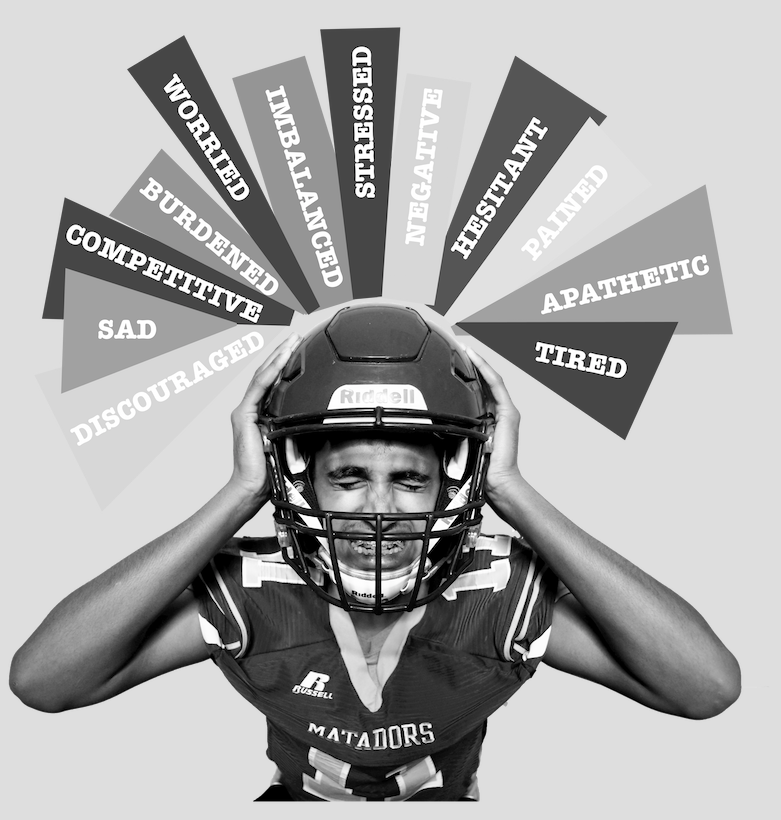The mental game
The role of mental well-being in sports
November 21, 2018
For senior Akshay Gopalkrishnan, basketball has always been about his physical status. His coaches stress the importance of staying in shape, avoiding injuries and being able to perform at his fullest potential during games. But, Gopalkrishnan admits, there is a whole other side to athletics — the mental side.
“I think [coaches tend to] prioritize your physical well-being over mental well-being, because it’s just easier [for them] to teach that,” Gopalkrishnan said.
For Dr. Sally Broder, a practicing sports psychologist in the Bay Area, her job is to teach patients exactly what Gopalkrishnan explained — how to live a healthy mental life. She stresses the importance of focusing on the positives in order to help her patients feel good about themselves. Through various techniques, including breathing, meditation and creative visualization, Broder increases her patients’ awareness so that they can improve their mental well-being while recovering from injuries.
“People get themselves really amped up and worried about the outcome,” Broder said. “One of the things I’ll do with them is help them notice their thoughts and help them focus on the positive outcomes, and a lot of creative visualization. So we’ll visualize them doing their sport, and visualize them succeeding. So if it was running a race, you sort of run it mentally first.”
Gopalkrishnan explains that he has experienced this mentality of ‘worrying over the outcome,’ mainly during competitive club basketball. He says the coaches there place little emphasis on the mental well-being of their players, because in order to maintain such a high level of play, teams focus more on competition.
“It’s competitive, and especially since a lot of the players on my team want to play college basketball, it is always [this mentality that you have to] ‘suck it up — you’re here for a reason and you [have] to perform,’” Gopalkrishnan said. “There is a little more pressure added because there is not much room for error and if you make a mistake then you get subbed out. To constantly think about that is hard.”
Senior Sammy Chan experienced similar struggles to Gopalkrishnan — she never really felt that any of her coaches understood what she was going through in terms of mental well-being.
“I just feel like the coaches don’t quite understand, let’s say you’re skipping practice or games for studying, homework, tests. They don’t care, they say you should finish that on your own time, do that before practice or after. I try not to let it affect me on the field, but just afterwards I have a lot more stress,” Chan said.
The added stress is the main reason why Chan decided to quit playing club soccer at the end of her junior year. Although she originally started eight years ago in order to relieve stress in her life, it took too much of a toll on her well-being and was no longer gratifying. She has, however, continued to play for MVHS, which she finds more relaxing.
Chan believes that stress is added when something feels like a commitment, or a job. Chan explained how much club soccer felt like a job and strayed away from what was really important — having fun.
“But high school soccer definitely helps me relieve stress, because I’m more with my friends from school and I’m closer to them, so I don’t feel like it’s a chore, I feel like I’m just hanging out with them,” Chan said. “Club is just more commitment, I’d say, and it’s just a lot more competitive, and you have to travel more, so it takes a lot more of your time.”
Similarly, Gopalkrishnan views high school sports as a stress reliever and not a burden. He says it allows him to free himself from all the aspects of everyday life that he worries about.
“I know for a lot of student athletes that have a lot of practices and have to do a bunch of school work and they’re stressed,” Gopalkrishnan said. “I don’t see it like that. I get to spend two hours doing what I love, and I may have more homework but that is a sacrifice I am willing to make.”
Though Gopalkrishnan was not overwhelmed by the balance between school and sports, former boys soccer coach Pooya Hajjarian understands that MVHS athletes struggle with achieving this balance. As a coach from 2011 and 2014, he prioritized the mental well-being of his players through open communication.
“You do not need to tell me the details of [the situation], but I need to know what is going on so I can be your support,” Hajjarian said. “I did not want [my players] to be like ‘this is so scary, oh my God, I got to tell coach about this.’ I wanted them to be like ‘this is one of my advocates, he is a support system for me.’”
Since Hajjarian is also a teacher at MVHS, he has an understanding of the competitive environment that students have to experience every day which allowed him to adjust the way that he coached. Like Hajjarian, English teacher Sara Borelli — the girls varsity basketball coach — feels that the athletic culture at MVHS allows for more emphasis to be placed on players’ mental well-being.
“I think because we’re not a powerhouse like [Archbishop Mitty HS], we don’t have that ‘we just have to win, we just have to win at all costs’ attitude as coaches,” Borelli said. “It’s more like ‘let’s build community.’ So I think a majority of the coaches do have that mentality of also thinking of the well-being of kids.”
Borelli adds that if given the opportunity, MVHS athletes would definitely benefit from a sports psychologist like Broder, mainly because that would boost the player’s self-esteem and change their mindset. She explains that she has noticed a decrease in athletes’ confidence as a whole.
“It used to be like ‘I’m going to work just as hard as everyone else to get on their level,’ versus a mentality like ‘well they’re better than me so [there’s no point],’” Borelli said. “I think a sports psychologist would definitely come into play in that regard … rebuilding that self-confidence to be better — you can be just as good, you’ve just got to work a little harder.”
Broder explains the importance of communication between coaches and players, something that both Borelli and Hajjarian emphasized. She says that positivity is the key to increase mental well-being.
“There’s a formula, it’s like for each negative or critical thing you say to someone you want to have six positive things that you talk about because kids […] will pick up way more of the negative things,” Broder said. “While the coach wants to pull out the very best from someone they want the person to enjoy the sport, [they need to] make sure that they’re making it fun.”
Physiologically, Broder explains that exercise releases adrenaline and endorphins, chemicals that elevate the athlete’s mood and act as a natural antidepressant. She says these chemicals are good for the brain as well as self-esteem. She does, however, emphasize that this must be taken with caution, because a lack of balance within a team or a sport can nullify these benefits.

“When there’s too much emphasis on perfection and winning and not enough balanced emphasis on getting the full experience of getting closer to your teammates and the life experience of the enjoyment of sports, then [sports] can be super stressful,” Broder said.
Though winning is obviously a part of sports, Broder says athletes should also focus on the way they sport makes them feel — after all, the reason they play is because they enjoy it. Broder mentioned that athletes are encouraged to change their overall mindset so that it is easier for them to focus on the positives of life and not the negatives.
“Rather than focusing so much on ‘winning,’ it’s when they’re enjoying what they’re doing that they’re a lot more likely to be good at it,” Broder said. “Instead of focusing on what you are nervous about, focus on your goal, focus on already being there.”
To Gopalkrishnan, it’s that enjoyment of the game itself that will help improve an athlete’s mental well-being.
“When I play basketball, I just forget everything, especially school, and I just focus on [the game],” Gopalkrishnan said. “It helps free myself from all my schoolwork and I think that improves my mental health as well as my physical health — the process of getting in shape and becoming stronger makes me feel more confident in myself.”



















